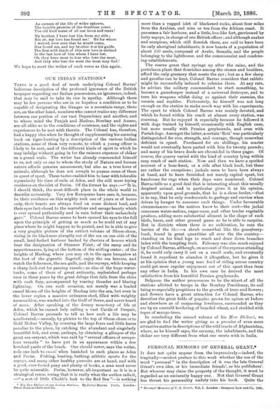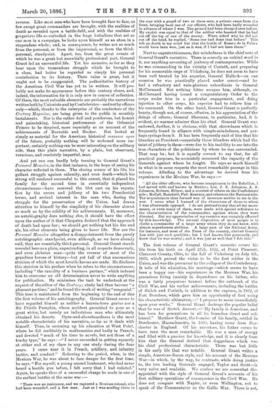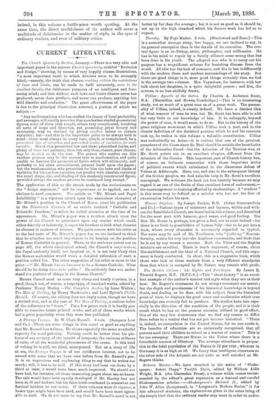PERSONAL MEMOIRS OF GENERAL GRANT.* IT does not quite appear
from the impressively—indeed, the tragically—modest preface to this work whether the use of the word " personal " in the description of it was the late General Grant's own idea, or his immediate friends', or his publishers'. But whoever may claim the property of the thought, it must be regarded as an eminently happy one.. Not that General Grant has thrust his personality unduly into his book. Quite the • Personal Memoirs of II. S. Grant. Vol. I. London : Sampson Low and Co. 1b86. reverse. Like most men who have been brought face to face, as few except great commanders are brought, with the realities of death as revealed upon a battle-field, and with the realities of gregarious life as embodied in the huge battalions that act as one man in a campaign, he looks upon himself as an atom in a stupendous whole ; and, in consequence, he writes not so much from the personal, or from the impersonal, as from the third- personal, standpoint. Apart, too, from the great events of which he was a great but essentially professional part, General Grant led an uneventful life. Yet his memoirs, so far as they bear upon the tremendous struggle which he brought to a close, had better be regarded as simply his personal contribution to its history. Their value is great, but it ought not to be exaggerated. The authoritative history of the American Civil War has yet to be written. It will pro- bably not make its appearance before this century closes, and, indeed, the information for it is only now in course of collection. 'Of these, the most valuable elements are probably the narratives written both by Unionists and by Confederates—and not by officers only—which, thanks to the enterprise of the conductors of the 'Century Magazine, are being given to the public in monthly instalments. Nor is the rather dull and ponderous, but honest and painstaking, historical performance of the Orleanist Princes to be despised, more especially as an account of the achievements of Burnside and Hooker. But looked at simply as material for the American historical magnum opus of the future, probably nothing will be reckoned more im- portant, certainly nothing can be more interesting on the military side, than this plain narrative, by a plain, but observant, veracious, and resolutely impartial, man.
And yet one can hardly help turning to General Grant's Personal Memoirs, in the first instance, in the hope of seeing his character reflected in them. The closing scenes of his life, his gallant struggle against calamity, and even death—which his strong will rendered successful to this extent, that it placed his family for the second time in essentially independent circumstances—have removed the blot cast on his reputa- tion by the errors and jobbery of his two Presidential terms, and revived interest in the man who, during the struggle for the preservation of the Union, had drawn attention to himself by the simplicity of his character almost as much as by the solidity of his achievements. If, moreover, an autobiography does nothing else, it should have the effect upon the author of it that Cleopatra declared that the approach of death had upon her ; we should get nothing but his fire and air, his other elements being given to baser life. Nor are the Personal Memoirs altogether a disappointment from the purely autobiographic standpoint, even although, as we have already said, they are essentially third-personal. General Grant stands revealed here as a plain, unpretending, in all respects democratic, and even plebeian man—quite the reverse of most of the grandiose heroes of history—but yet full of that unconscious stoicism of which the most lovable heroes are made. He discloses this stoicism in his preface when he refers to the circumstances, including "the rascality of a business partner," which induced him to overcome an old determination never to write anything for publication. He minimises the task he undertook at the request of the editor of the Century ; study had then become " a pleasant pastime," and he found the work of writing "congenial." This tone is maintained from the beginning to the end of this the first volume of his autobiography. General Grant seems to have regarded himself as neither a heaven-born genius nor a Sir Frizzle Pumpkin, whom accident permitted to pose as a great victor, but merely an industrious man who ultimately obtained his deserts. Open-and-aboveboardness is the most notable characteristic of his narrative, so far as it deals with himself. Thus, in summing up his education at West Point, where he did creditably in mathematics and badly in French, and devoted " much of his time to ncvels, but not those of a trashy type," he says :—" I never succeeded in getting squarely at either end of my class in any one study daring the four years. I came near it is French, artillery, and infantry tactics, and conduct." Referring to the period, when, in the Mexican War, he was about to face danger for the first time, tie sap, " For myself, a young second lieutenant, who had never beard a hostile gun before, I felt sorry that I had enlisted." Again, he speaks thus of a successful charge he made in one of the earliest battles of the same war :- " There was no resistance, and we captured a Mexican colonel, who had been wounded, and a few men. Just as I was sending them to the rear with a guard of two or three men, a private came from the front, bringing back one of our officers, who had been badly wounded in advance of where I was. The ground had been charged over before. My exploit was equal to that of the soldier who boasted that he had cut off the leg of one of the enemy. When asked why he did not cut off the head, he replied, ' Some one had done that before.' This left no doubt in my mind bat that the battle of Resaca de la Palms would have been won, just as it was, if I-had not been there."
Next to unpretentiousness, fair mindedness is the chief note of General Grant's narrative. There is scarcely an unkind word in it, nor anything savouring of jealousy of contemporaries. While he was commanding in the vicinity of Corinth, and preparing for his memorable siege of Vicksburg, he does not seem to have been well treated by his superior, General Halleck—on one occasion he was practically placed under arrest—and he had a refractory and vain-glorious subordinate in General McClernand. But nothing bitter escapes him, although, on McClernand having issued a congratulatory Order to the corps under him in a particular engagement, and doing injustice to other corps, his superior had to relieve him of his command. On the other hand, General Grant is perfectly hearty, though not, of course, effusive, in his appreciation of the doings of others; General Sherman, in particular, had, it is evident, no warmer admirer than his chief. General Grant was endowed, further, it is obvious, with that shrewdness which is frequently found in alliance with simple-mindedness, and per- haps springs from it. It has been frequently said of him that his blunders as President—especially those blunders which had the taint of jobbery in them—were due to his inability to see into the true characters of the politicians by whom he was surrounded.
That may be ; but it is equally correct to say that, for all practical purposes, he accurately measured the capacity of the Generals against whom he fought. He says as much himself in what is in some respects the most remarkable passage in this volume. Alluding to the advantage he derived from his experiences in the Mexican War, he says :—
" All the older officers, who became conspicuous in the Rebellion, I had served with and known in Mexico ; Lee, J. E. Johnston, A. S. Johnston, Holmes, Hebert, and a number of others on the Confederate side ; McCall, Mansfield, Phil. Kearney, and others on the National side. The acquaintance thus formed was of immense service to me in the war. I mean what I learned of the characters of those to whom I was afterwards opposed. I do not pretend to say that all my move- ments, or even many of them, were made with special reference to the characteristics of the commanders against whom they were directed. But my appreciation of my enemies was certainly affected by this knowledge. The natural disposition of most people is to clothe a commander of a large army whom they do not know, with almost superhuman abilities. A large part of the National Army, for instance, and most of the Press of the country, clothed General Lee with just such qualities ; but I had knuwn him personally, and knew that he was mortal ; and it was just as well that I felt this."
The first volume of General Grant's memoirs corers his life from his birth on April 27th, 1822, at Point Pleasant, Clerroont County, Ohio, to the fall of Vicksburg on July 4th, 1863, which proved the victor to be the first soldier in the Union, and was the precursor to the collapse of the Confederacy. It tells of his education, his marriage—which seems to have been a happy one—his experiences in the Mexican War, his precarious living (mainly in dependence on his father, who was a fairly prosperous tanner) before the outbreak of the Civil War, and his earlier achievements, including the battles of Shiloh and Corinth, in addition to the capture, in 1862, of Fort Donelson, which gave him an opportunity of first using his characteristic ultimatum,—" I propose to move immediately upon your works." General Grant destroys the popular belief that he was of Scotch descent,—" My family is American, and has been for generations in all its branches direct and col- lateral." Matthew Grant, the founder of his family, settled in Dorchester, Massachusetts, in 1630, having come from Dor- chester in England. Of his ancestors, his father seems to have been the most remarkable. He was a man of energy and filled with a passion for knowledge, and it is clearly from him that the General derived that doggedness which was his chief professional characteristic. There was but little in his early life that was notable. General Grant writes a simple, American-Saxon style, and his account of the Mexican War—in which, by the way, be contrasts, while doing justice to, the two leading Generals engaged, Taylor and Scott—is very naive and readable. We confess we are somewhat dis- appointed with the style of General Grant's accounts of his first military operations of consequence in the Civil War. He does not compare with Napier, or even Wellington, not to speak of the Commentator on the Gallic War. There is not,
indeed, in this volume a battle-piece worth quoting. At the same time, the direct truthfulness of its author will cover a multitude of deficiencies in the matter of style, in the eyes of ordinary readers, and even of military critics.




































 Previous page
Previous page